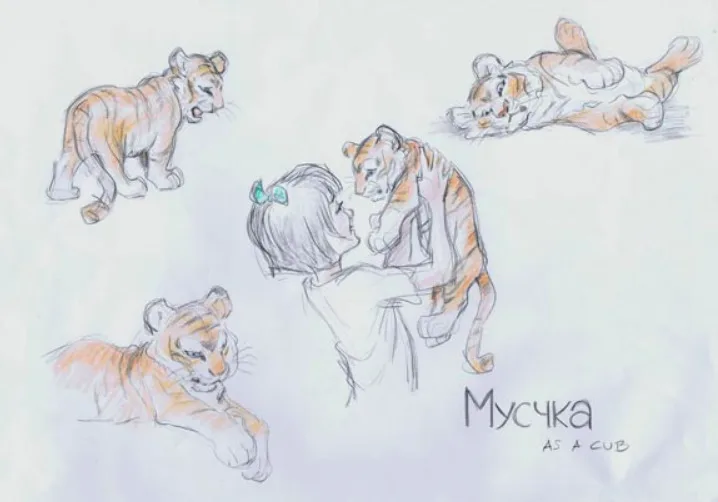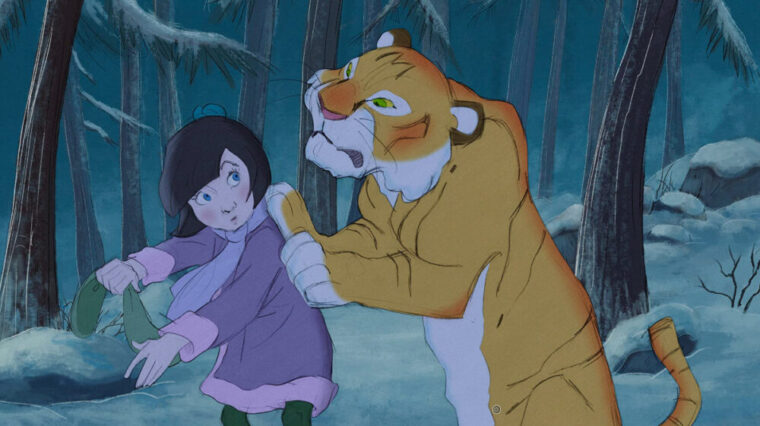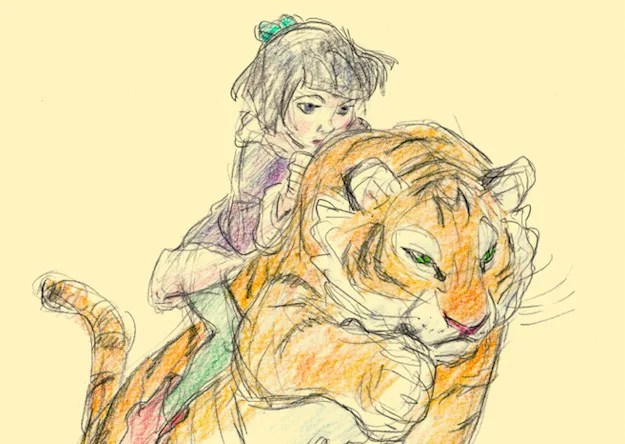Humans interacting with nature’s animals has been a mainstay in the history of animation. Now, Disney Legend and animation master Andreas Deja has drawn and directed his first animated short infused with those bonding themes in Mushka. Nearly a decade in development, Mushka arrives as a rare gem currently clawing at the film festival scene, brimming with a gentle purity lost on most mainstream animated features delivered in the digital age.
Mushka is set in the Soviet Union during the mid-1970s and tells the heart-tugging tale of a Kyiv girl named Sarah who leaves her grandmother’s home to live with her estranged father in Siberia. While trying to adapt in this bleak environment, she rescues an orphaned tiger cub and raises him to maturity. As threatening forces try to hunt the big cat for profit, and she must finally return him to the forest.

Sketchbook Appeal
Deja is the award-winning talent behind numerous Disney blockbusters and was the guiding hand behind characters like The Little Mermaid’s King Triton, Beauty and the Beast’s Gaston, Aladdin’s Jafar and The Lion King’s Scar. Here he returns to top form by using a rough, colored pencil sketchbook tone to Mushka’s drawings and colors that provide a throwback appeal.
To top off this personal project, Mushka also benefits from a melancholy theme song written by the great Richard Sherman, a sweeping musical score courtesy of Fabrizio Mancinelli, and atmospheric background paintings from Natalie Franscioni-Karp.

Mushka premiered at the Stuttgart International Festival of Animated Film (ITFS) and also screened at Animayo in Spain’s Canary Islands in early May. That’s where we caught up with Deja. “The origin for the story came up about 10 years ago when I started thinking about a project that I could get my teeth into and would be fun to do,” he tells Animation Magazine.
“Then we started on production about eight years ago. I always liked stories with animal-human relationships. Maybe because I had some experience with big cats from The Lion King, having done the research there. I thought I could translate that into a big tiger and introduce a girl and make it about the two of them.”
Placing the film in Russia’s Cold War period allowed for certain thematic choices that provide Mushka with a distinctive vintage quality. “I thought it might not be linked to a specific time,” says the director. “But because of the ending we had where Alex has gotten into the business of rescuing tigers, I wondered — when did the Soviet Union start realizing that they’re having a tiger problem and start trying to do something about it? As it turns out, it happened sometime around the mid-’70s. So, we started there because it makes the ending credible. At that time, Russia was finding out that big cats were disappearing.”
To flesh out the story beyond the simple concept, Deja reached out to his friend Michael McKinney, a freelance author, painter, poet and storyteller. “He came up with a screenplay which really read like a novel,” Deja adds. “All of a sudden, I had a grandmother, there was a flashback in time and a father that the girl never knew.
Music was also a crucial component for Deja and Oscar-winning Disney songwriter Richard Sherman graciously came aboard with an original theme. “Richard asked me what I was doing these days and I told him the story of Mushka and where it was at that point,” he recalls. “He liked it and got inspired and said that maybe somebody at this lunch table could write some music for your film. He came up with this beautiful lullaby which plays twice in the film, once during a montage sequence then the full song over ending credits. He set the tone musically and gave us the emotional musical core.”
“If Eric [Larson] hadn’t seen the potential in what I had sent him, my career wouldn’t have existed. He thought that for an audience to believe in your characters you have to be sincere in your work and your animation.”
— Andreas Deja
Composer Fabrizio Mancinelli took cues from Sherman and conceived the elegant score. “It’s a big score,” notes Deja. “It’s really emotional and we have a 60-piece orchestra that played. I think it’s some of his best work. I couldn’t be happier. We showed it to Richard late last year and he was thrilled with it. And that’s something to hold dear to your heart when the old maestro gives his stamp of approval.”
Mushka’s credits feature a dedication to Deja’s mentor Eric Larson, one of Disney’s Nine Old Men who worked on classics like Pinocchio, Fantasia, Bambi, Peter Pan, and Sleeping Beauty. “He was basically the one who hired me to what was then called Walt Disney Productions. I got in touch with Eric as an art student from Germany. If Eric hadn’t seen the potential in what I had sent him, my career wouldn’t have existed. He thought that for an audience to believe in your characters you have to be sincere in your work and your animation. He was a big help — not just to myself, but to many of us learning under him.”
For more information, visit mushkathemovie.com.











 Win a Funko X Lilo & Stitch Prize Pack!
Win a Funko X Lilo & Stitch Prize Pack! 


